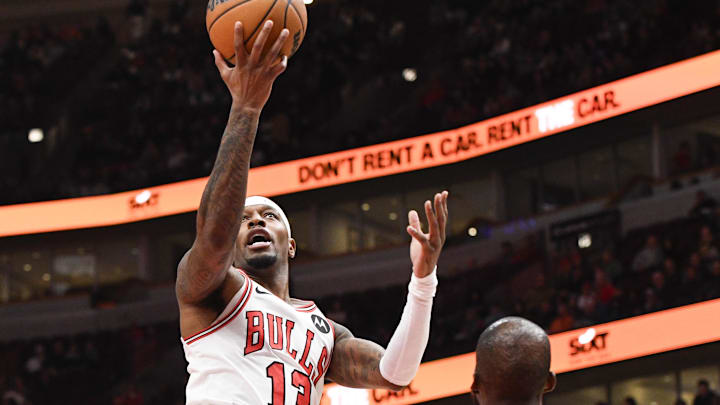Trade season is full steam ahead, and the Chicago Bulls are the locomotive. The Bulls are reportedly open to a fire sale, including just about every player on their roster in trade talks. While 11th-overall pick Matas Buzelis and recent draftees Dalen Terry and Julian Phillips may be off-limits, it doesn't appear any Chicago veteran is safe.
Regardless of how Chicago feels about its players, trading in today's NBA isn't as easy as it used to be. The newest CBA has implemented rigorous trade restrictions, forcing teams to rethink everything, beginning with a player's initial contract.
Trading under the new CBA is no easy task
In a recent piece from The Stein Line (subscription required), NBA Insider Jake Fischer delved into the new era of trading. Referencing the New York Knicks' recent mega-deals involving Mikal Bridges and Karl-Anthony Towns, Fischer elaborated on the usefulness of minimum-level contracts when trading under today's CBA.
Rather than a direct, player-for-player swap, the Knicks included several minimum contracts to dodge the first salary cap apron and preserve future financial flexibility. Moreover, the Towns' trade opened up an entirely new loophole, as New York sent out five players in the trade, three of whom earned $1 above the minimum contract to complete the deal. The Knicks opted to use this strategy because of a stipulation prohibiting teams from sending out multiple minimum-level contracts if the acquired players are less than the outgoing players—as was the case in acquiring Towns, who earns roughly $50 million this season.
Some salary cap and contract negotiation wizardry are needed to avoid the harsh penalties of the first and second tax aprons. However, in an odd turn of events, the "minimum contract stipulation" will abruptly be lifted soon. On December 15, the same day that most of the new contract signees are made available for trade, teams can aggregate multiple minimum-level salary players in a trade until the February 6 deadline.
Instead of minimum-contract players flying under the radar, these players are beginning to brim with trade appeal. Contending teams such as the Minnesota Timberwolves, Milwaukee Bucks, and Phoenix Suns are strapped by strenuous second-apron penalties. Fortunately for the three previously mentioned squads, the so-called "minimum contract stipulation" will be lifted, allowing these squads serviceable players on minimum contracts.
Torrey Craig's minimum salary makes for a viable trade candidate
Before further exploring this rabbit hole of trade logistics, let's revert back to the seemingly trade-impending Bulls. Chicago, at 10-13, isn't a competitor. The roster is oddly constructed yet is littered with appealing contracts, such as Coby White's modest three-year, $36 million contract and Ayo Dosunmu's inexpensive three-year, $7 million pact. However, as the past few paragraphs have illustrated, there might not be a more tradeable contract than Torrey Craig's minimum, one-year, $2.8 million deal.
At 33 years old with 438 games under his belt, Craig's spot on the Bulls' roster is nonsensical. He's less than two weeks away from turning 34, making Craig the second-oldest player on the team. Sure, Craig's experience is beneficial for a young locker room, and he's capable of stepping in at a moment's notice. Nonetheless, he's far more valuable suiting up for a contender.
Craig has appeared in a mere six games this season, totaling 67 minutes for sub-.500 Bulls. Instead of wasting away on Chicago's bench, several teams, like the Suns, could use Craig's services. Phoenix comes first to mind because of the inexperience and injuries on the wing. Starting power forward Kevin Durant has already missed eight games and counting; the same goes for shooting guard Bradley Beal.
Although several restrictions are in place to limit the second-apron Suns from making trades to bolster an already expensive roster, the limitations on acquiring minimum-level contracts are obsolete. Besides Phoenix, the Timberwolves and Bucks make sense as potential destinations. Neither team is especially deep, with Minnesota only running an eight-man lineup.
For example, Chicago could acquire several intriguing players in exchange for Craig, such as Bol Bol from the Suns, Josh Minott from the Wolves, or MarJon Beauchamp from the Bucks. All three players are 25 or younger and out of the rotation, yet possess untapped potential.
Aside from the strictly player-for-player swaps, Craig could be a sweetener in a trade consisting of former All-Star and $45 million per year player Zach LaVine. The possibilities are seemingly endless, as a minimum contract deems Craig an extremely malleable asset. The eight-year veteran may not be the most desirable trade asset, but he's surely one of the more reasonable candidates on the market.
